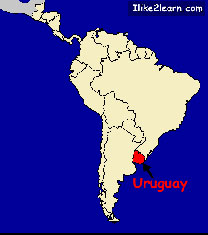We rarely hear about Uruguay, but the country wants to lead South American on wind energy, and developers are ready to spend $2.6 billion to make it happen.
Uruguay gets 13% of its electricity from wind and wants it to reach 38% by the end of 2017, reports Bloomberg. That would bring it close to the world leader, Denmark, which is at 43%.
This small country with just 3.3 million people was the fastest growing wind market last year, installing 479 megawatts, according to the World Wind Energy Association. Most of its electricity comes from hydropower, but with droughts an ever-bigger factor, relying on wind to close the gap will mean they don’t have to turn to fossil fuels.

"Uruguay is like a big wind farm because it’s flat," a wind developer told Bloomberg. That means cheap electricity at 65-70 cents per kilowatt-hour – half that of natural gas, says Gonzalo Casaravilla, who chairs the state-owned electric utility.
It could also end up exporting wind energy to neighboring Argentina and Brazil. Out of the 3.7 GW added last year in Latin America, 2.8 GW was in Brazil.
Brazil Moves on Solar
Late last year, Brazil held its first solar auction to give contracts for its first large solar projects. The very aggressive bidding ended with contracts for 31 solar projects, 1 gigawatt in all.
After eight hours of bidding, the final price was $87 per megawatt-hour, one of the lowest solar prices in the world, according to Bloomberg New Energy Finance (BNEF). Uruguay has been the cheapest at $91.5, until now for unsubsidized solar.
Many development sites will be paired with existing wind farms, cutting the costs for land and transmission infrastructure.
Brazil’s historic drought is forcing it to diversify from hydropower, the main source of its electricity.
"The Brazilian solar opportunity is only just getting started, but has the potential to be gigantic, on the order of tens of gigawatts by the middle of the next decade," says Michel Di Capua at BNEF. "Investors would ordinarily want to keep their return targets high when entering a new market, but the temptation of being a first mover into this market, even though it meant conceding on returns, proved to be just too irresistible."
